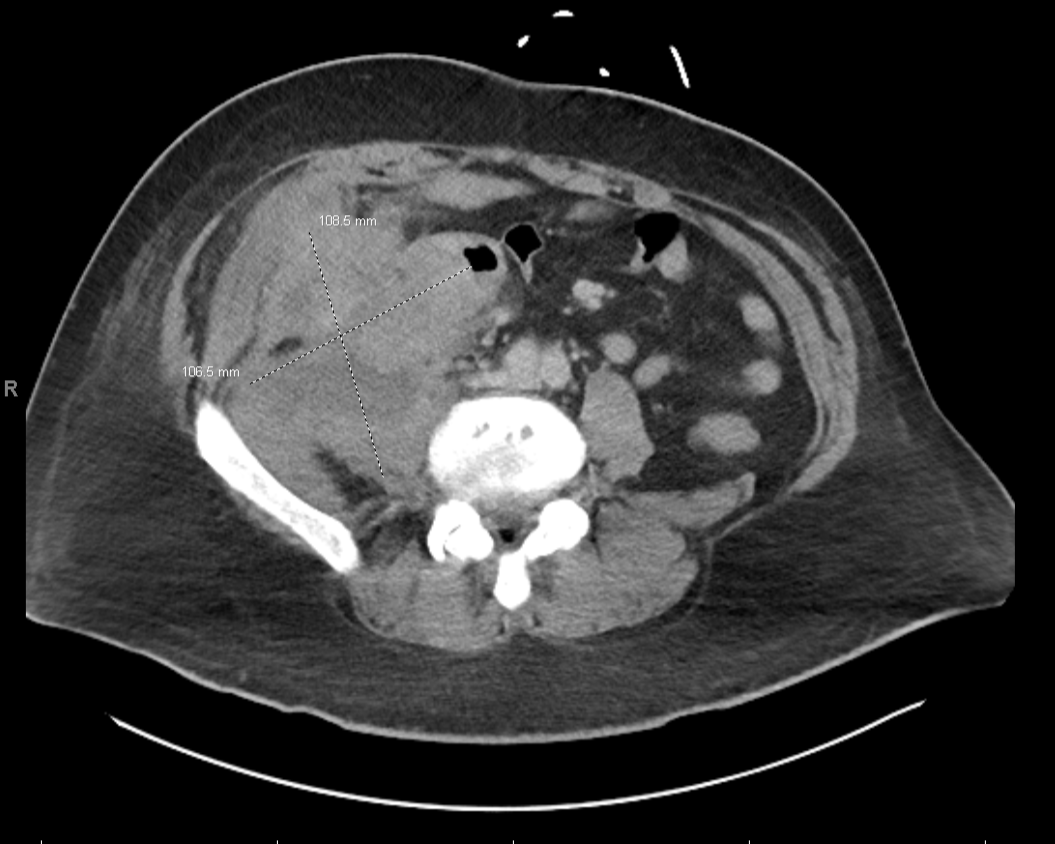Monday Poster Session
Category: Colon
P2508 - Invasive Colon Adenocarcinoma Presenting With Retroperitoneal Abscess: A Rare Complication
Monday, October 27, 2025
10:30 AM - 4:00 PM PDT
Location: Exhibit Hall

Anjo Chacko, MD
Broward Health North
Coral Springs, FL
Presenting Author(s)
Anjo Chacko, MD1, Danielle DeGreef, DO2, Laura Miranda-Burgos, MD3, Keshavi Mahesh, MD4, Harold Rosen, MD3
1Broward Health North, Coral Springs, FL; 2Broward Health North, Margate, FL; 3Broward Health North, Deerfield Beach, FL; 4Broward Health North, Pompano Beach, FL
Introduction: Invasive colonic adenocarcinoma presenting with intra-abdominal or retroperitoneal abscess is rare and often clinically misleading. Abscess formation occurs in only 0.3–0.4% of colonic cancer cases, and fewer than 1% present with an abscess as the initial finding. Retroperitoneal abscess specifically is an even more uncommon manifestation, with limited case reports in the literature. These atypical presentations frequently lead to delayed diagnosis and treatment due to their nonspecific symptoms and overlap with infectious or inflammatory conditions. Early recognition is critical, particularly in patients with limited access to routine colorectal cancer screening.
Case Description/
Methods: A 56-year-old male with a history of hypertension, diabetes, and hyperlipidemia presented with progressive generalized weakness and multiple falls over the past year, along with lightheadedness and two weeks of intermittent right lower quadrant abdominal pain. He denied fever, gastrointestinal bleeding, or recent illness. On presentation, he was hemodynamically stable; physical examination revealed right lower quadrant tenderness with guarding. Laboratory studies showed profound anemia (hemoglobin 4.8 g/dL), marked leukocytosis (WBC 45 × 10⁹/L), and thrombocytosis (platelets 968 × 10⁹/L). CT abdomen/pelvis demonstrated a large, complex pelvic mass with cystic components involving the colon and iliopsoas muscle. Intraoperative findings included a large retroperitoneal abscess and a cecal mass. He underwent urgent drainage of intra-abdominal and retroperitoneal abscesses, followed by right hemicolectomy with ileal anastomosis and bilateral ureteral stent placement. Pathology confirmed a moderately differentiated invasive adenocarcinoma with full-thickness colonic wall perforation.
Discussion: This case highlights an unusual and severe initial presentation of colon cancer. Retroperitoneal abscess formation is rare and easily overlooked, especially in patients without classic cancer symptoms. A high index of suspicion, timely imaging, and multidisciplinary coordination are essential. This case also illustrates how social determinants, such as lack of insurance, delay necessary screening and diagnosis. Increased awareness, earlier imaging in atypical cases, and improved access to colorectal screening are critical. Further research is needed to define optimal diagnostic strategies and outcomes for malignancy-associated abscesses.

Figure: Figure 1. Axial CT abdomen/pelvis image demonstrating a massive complex cystic pelvic mass involving the colon and iliopsoas muscle.
Disclosures:
Anjo Chacko indicated no relevant financial relationships.
Danielle DeGreef indicated no relevant financial relationships.
Laura Miranda-Burgos indicated no relevant financial relationships.
Keshavi Mahesh indicated no relevant financial relationships.
Harold Rosen indicated no relevant financial relationships.
Anjo Chacko, MD1, Danielle DeGreef, DO2, Laura Miranda-Burgos, MD3, Keshavi Mahesh, MD4, Harold Rosen, MD3. P2508 - Invasive Colon Adenocarcinoma Presenting With Retroperitoneal Abscess: A Rare Complication, ACG 2025 Annual Scientific Meeting Abstracts. Phoenix, AZ: American College of Gastroenterology.
1Broward Health North, Coral Springs, FL; 2Broward Health North, Margate, FL; 3Broward Health North, Deerfield Beach, FL; 4Broward Health North, Pompano Beach, FL
Introduction: Invasive colonic adenocarcinoma presenting with intra-abdominal or retroperitoneal abscess is rare and often clinically misleading. Abscess formation occurs in only 0.3–0.4% of colonic cancer cases, and fewer than 1% present with an abscess as the initial finding. Retroperitoneal abscess specifically is an even more uncommon manifestation, with limited case reports in the literature. These atypical presentations frequently lead to delayed diagnosis and treatment due to their nonspecific symptoms and overlap with infectious or inflammatory conditions. Early recognition is critical, particularly in patients with limited access to routine colorectal cancer screening.
Case Description/
Methods: A 56-year-old male with a history of hypertension, diabetes, and hyperlipidemia presented with progressive generalized weakness and multiple falls over the past year, along with lightheadedness and two weeks of intermittent right lower quadrant abdominal pain. He denied fever, gastrointestinal bleeding, or recent illness. On presentation, he was hemodynamically stable; physical examination revealed right lower quadrant tenderness with guarding. Laboratory studies showed profound anemia (hemoglobin 4.8 g/dL), marked leukocytosis (WBC 45 × 10⁹/L), and thrombocytosis (platelets 968 × 10⁹/L). CT abdomen/pelvis demonstrated a large, complex pelvic mass with cystic components involving the colon and iliopsoas muscle. Intraoperative findings included a large retroperitoneal abscess and a cecal mass. He underwent urgent drainage of intra-abdominal and retroperitoneal abscesses, followed by right hemicolectomy with ileal anastomosis and bilateral ureteral stent placement. Pathology confirmed a moderately differentiated invasive adenocarcinoma with full-thickness colonic wall perforation.
Discussion: This case highlights an unusual and severe initial presentation of colon cancer. Retroperitoneal abscess formation is rare and easily overlooked, especially in patients without classic cancer symptoms. A high index of suspicion, timely imaging, and multidisciplinary coordination are essential. This case also illustrates how social determinants, such as lack of insurance, delay necessary screening and diagnosis. Increased awareness, earlier imaging in atypical cases, and improved access to colorectal screening are critical. Further research is needed to define optimal diagnostic strategies and outcomes for malignancy-associated abscesses.

Figure: Figure 1. Axial CT abdomen/pelvis image demonstrating a massive complex cystic pelvic mass involving the colon and iliopsoas muscle.
Disclosures:
Anjo Chacko indicated no relevant financial relationships.
Danielle DeGreef indicated no relevant financial relationships.
Laura Miranda-Burgos indicated no relevant financial relationships.
Keshavi Mahesh indicated no relevant financial relationships.
Harold Rosen indicated no relevant financial relationships.
Anjo Chacko, MD1, Danielle DeGreef, DO2, Laura Miranda-Burgos, MD3, Keshavi Mahesh, MD4, Harold Rosen, MD3. P2508 - Invasive Colon Adenocarcinoma Presenting With Retroperitoneal Abscess: A Rare Complication, ACG 2025 Annual Scientific Meeting Abstracts. Phoenix, AZ: American College of Gastroenterology.
